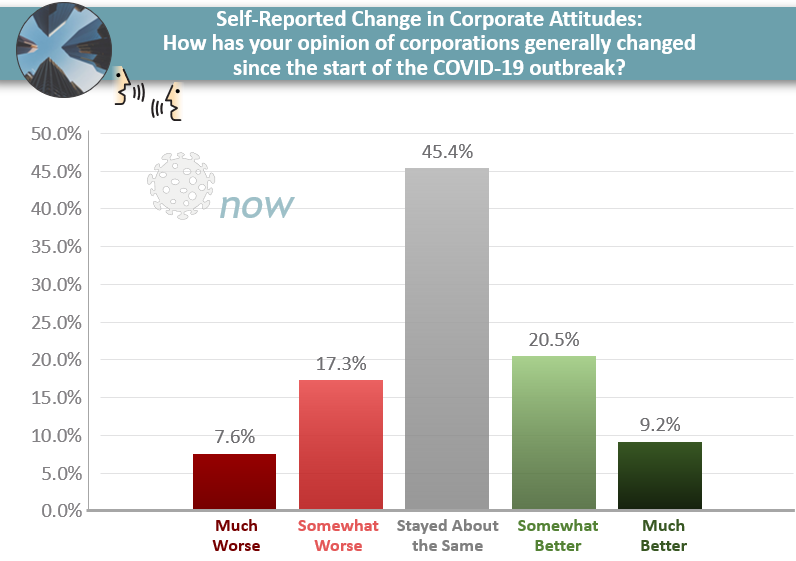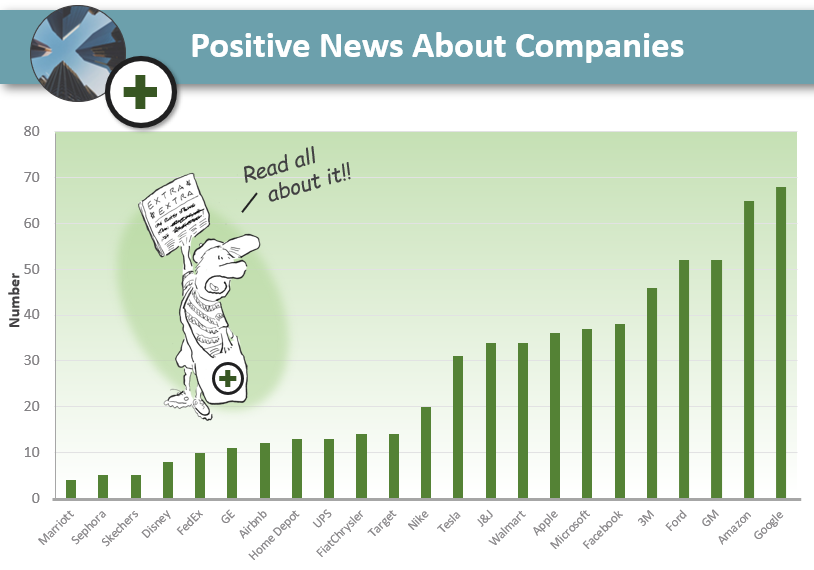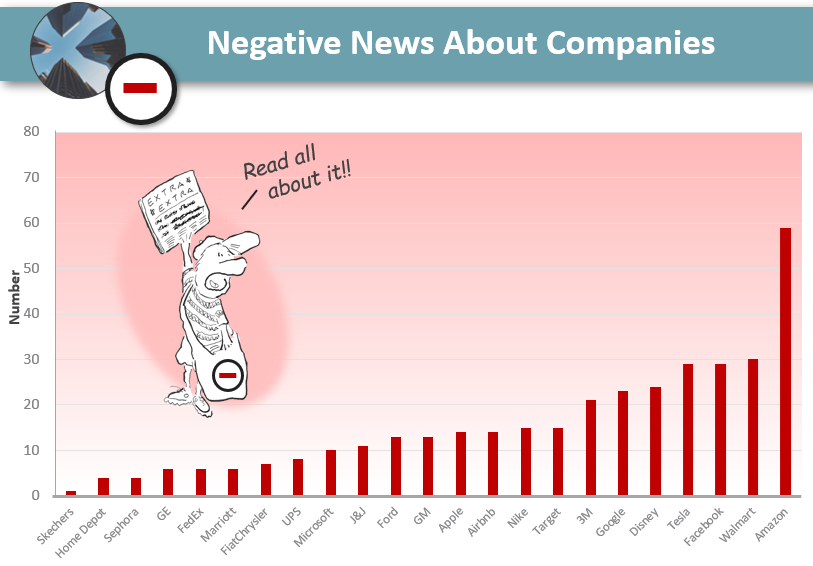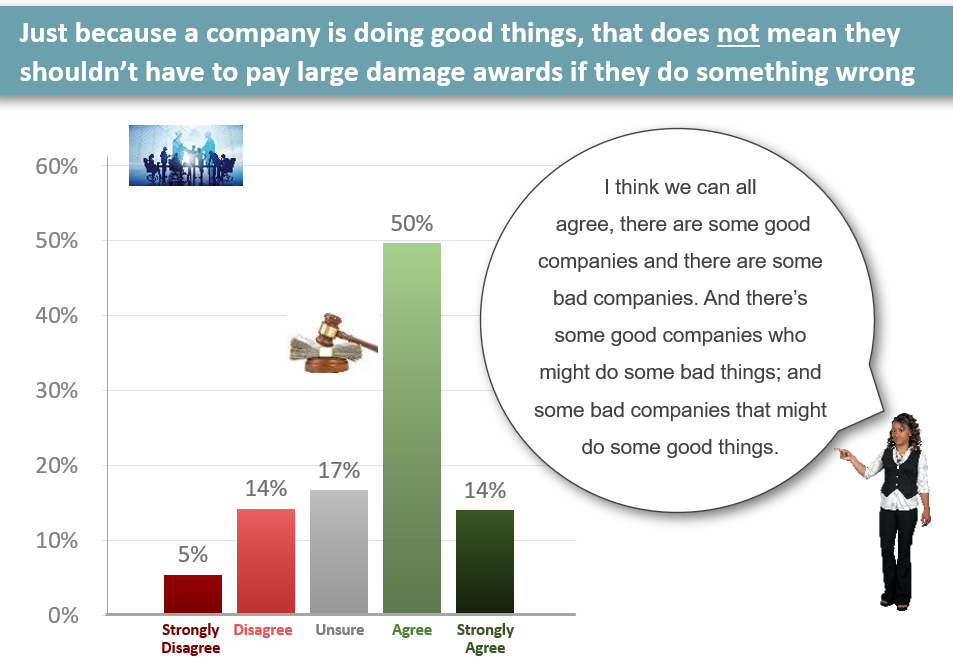Source of article Litigation Insights.
I can understand why someone would come in predisposed against big corporations, because they are in the limelight more and more these days, with things like corruption from the higher-ups. I used to believe authority is always right. I trusted when I was younger – but I question everything now.
In our mock trials, we’ve frequently heard mock jurors like the above question the motivations of corporate defendants. Now, in the midst of COVID-19, and the public looking for leadership in a crisis, corporations face even more scrutiny than usual.
To track what jurors have heard in the media about positive or negative actions taken by individual corporations, we developed a survey1 that assessed respondents’ views on a wide variety of companies in the news during March and April, and we also assessed overall juror attitudes toward corporations. How will corporate defendants be perceived in court once civil jury trials resume? How do jurors’ views differ pre- and post-COVID-19? Here are our most interesting findings:
General Juror Views of Corporations
In our past corporate attitude surveys, only 15% of jurors had reported feeling very positive toward corporations. On the other end of the spectrum, just 10% of jurors held very negative views of corporations.
However, jurors’ views have polarized slightly further in 2020. While overall, jurors’ positivity toward corporations fell by two points, those who felt very positively increased by three percentage points. While not a meaningful difference, it does suggest that corporations have retained their more loyal jury contingent during the time of COVID-19. That said, the number of negative views increased six percentage points. Although this increase cannot be attributed completely to COVID-19, it demonstrates how these views can shift over time. With heightened public anxiety surrounding the pandemic, job losses, and company closures, jurors will be monitoring corporations even more closely to see how they react.

In addition to conducting our own examination of past data on corporate attitudes, our new survey asked jurors to report if their opinions changed more positively or negatively since the start of the COVID-19 outbreak. More jurors – nearly 30% – reported having somewhat better to much better opinions of corporations, while just short of 25% held somewhat worse or much worse opinions. The largest segment of jurors, however, believed their views had stayed about the same.

Current Views of Specific Corporations
Although many jurors demonstrate negative opinions of corporations overall, oftentimes their attitudes toward specific companies reflect a more positive perspective. So, to determine their views on individual companies, jurors disclosed whether they had heard positive or negative news regarding a particular company’s actions in light of the COVID-19 pandemic.2
As the below graphs illustrate, respondents heard more positive news than negative news about corporate actions taken since the COVID-19 outbreak. In fact, only 15% of respondents had heard no positive news about the companies listed, whereas 36% of respondents had heard no negative news about the same companies.


Next, jurors specified whether that information influenced their opinion of the specific company. As expected, positive news improved opinions of these companies, and negative news lowered opinions. Interestingly, for individuals who heard both positive and negative news about a specific company, jurors’ resultant overall opinion tended toward positive; the positive news outweighed the negative news. (Even so, positive opinions will not necessarily translate into leniency for a corporation’s actions outside the pandemic context.)
Implications for Corporate Defendants
In light of the increased attention on corporate actions, several of our corporate clients wondered whether their response to the COVID-19 pandemic, whether making donations, working on a vaccine, or shifting their manufacturing toward respirator materials and other protective equipment, might translate into good will in other areas.
So, we asked survey respondents whether good deeds mean companies should be absolved of paying large damage awards. Unfortunately for corporate defendants, approximately 64% of jurors believed positive actions do not negate responsibility for negative actions.

To put this finding in the words of an actual juror, here’s how one juror in a recent voir dire explained the views toward corporations she’d indicated on her SJQ:
I think we can all agree, there are some good companies and there are some bad companies. And there’s some good companies that might do some bad things; and some bad companies that might do some good things.
But while juries won’t give companies a full pardon because of positive actions they took to help fight COVID-19, that doesn’t mean good deeds can’t help a company in trial.
A “Good Company” Story
While refuting a plaintiff’s allegations is a key part of any defense, it is equally important to develop an affirmative company story to convey to jurors. In other words, how should jurors characterize a company within the story of the case? What characteristics define it? What are the actions the company has taken to improve the community? How have its products helped people?
When the defense case focuses solely on rebutting the plaintiff’s claims, the defendant can appear overly defensive and allow the plaintiff to control the narrative; jurors will hear a “bad company” story with no counterbalance. But if defense counsel instead discusses the good that the company does (including actions it took during COVID-19), it can humanize the defendant. As the results above show, such actions won’t wholly excuse a defendant in a lawsuit, but they nevertheless help create a more well-rounded “good company” story to counter the plaintiff’s converse narrative.
Final Thoughts
Although general juror attitudes toward corporations have remained largely unchanged since the COVID-19 outbreak, attitudes toward specific companies have shifted based on jurors’ awareness of actions taken by companies. Companies that have helped in the effort to fight COVID-19 have enjoyed a positive shift in opinions, while companies whose actions have been perceived negatively have seen a negative shift in opinions. A positive shift is unlikely to have a large effect at trial, but it can still be a key factor as you build up your “good company” story defense.
To learn what types of company actions have been viewed as positive or negative, and the individual factors that influence these perceptions, look out for Part 2 (coming soon!).


By: Katrina Cook, Ph.D. – Consultant & Nick Polavin, Ph.D. – Consultant
References
1 This survey was completed by a total of 185 jury-eligible respondents.
2 We selected large companies that have been in the media spotlight for actions taken during the pandemic – both positive (e.g., manufacturing masks or hand sanitizer) and negative (e.g., raising prices for drug treatments).
The post Concerning Corporations: Juror Attitudes Toward Corporations in the Time of COVID-19 – Part 1 appeared first on Litigation Insights.
